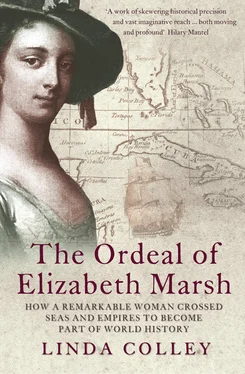Milbourne Marsh’s new life was also substantially different. No longer a full-time manual worker, he was now a ‘pen and ink’ man, without a uniform or a sword, and therefore on a different and lower level than the senior military and sea officers who ran the colony, yet indispensable and multi-tasked. Part of his job as the island’s Naval Officer was to act as Clerk of the Cheque: that is, as senior financial officer of Menorca’s naval dockyard. The naval stores lining the wharves of Mahón’s huge harbour, which extends inland for some six thousand yards, were his responsibility. So was paying the Britons and Menorcans who worked in the dockyard as shipwrights, sail-makers and carpenters, and in the navy’s victualling office, bakehouse, windmills and magazines. In addition, Milbourne acted as Clerk of the Survey, drafting maps and drawing up plans for new buildings and defences. At intervals he was Master Shipwright too, overseeing the repair and careening of incoming British warships and transports, and keeping an eye on the merchant ships arriving with provisions and bullion to pay the troops. In his limited leisure time he joined his wife, sons and newly accomplished daughter on Hospital Island, with its ‘rocks and precipices … intermixed with scattering houses’, where the navy’s local commander, surgeon and any visiting admirals were also accommodated. 3 But Milbourne’s daylight hours were spent in the undistinguished row of low-storeyed sheds that made up the naval dockyard, or rowing the small boat that came with his office from ship to ship in the harbour, seeking out information from their captains, or mustering men and resolving disagreements, or surveying the island’s innumerable coves, inlets and bays.
For Menorca was not a place of refuge and colonial ease. The British had seized it from Spain in 1708 for essentially the same reason that had led the Phoenicians, Greeks, Carthaginians, Romans, Arabs and Catalans to invade it before them, and for much the same reason too as would cause the United States Navy to maintain a base of operations there in the nineteenth century. Menorca offered an advantageous location from which to monitor and to seek to dominate the western Mediterranean. In the words of a British writer in 1756:
All ships sailing up the straits of Gibraltar, and bound to any part of Africa, east of Algiers, to any part of Italy, or to any part of Turkey, either in Asia or Europe, and all ships from any of those places, and bound to any port without the straits-mouth, must and usually do pass between this island and the coast of Africa. 4
Some of the main sea routes to and from Genoa, Livorno, Nice, Sicily, Marseilles, Lisbon, Tetuan and Tripoli lay within easy reach of Menorca. So did ships setting out from Spain’s Mediterranean ports, and from its naval bases, Cartagena and Cádiz. Possessed of Menorca and sufficient force, Britain could intervene in the commercial and naval activities of three of its imperial competitors: France, Spain, and the Ottoman Empire with its provinces in Northern Africa. Toulon, the prime French naval base, was 220 miles away from Menorca, within striking distance of a British fleet using the island as a base. Of course, the converse also applied. Ringed and replete with commercial, strategic and warlike possibilities, Menorca was itself a natural target. It was a ‘frontier garrison’, one politician had remarked in the 1720s, where discipline and watchfulness were mandatory ‘as if it were always in a state of war’. 5
The members of the Marsh family were introduced to the risks attendant on the island’s location and strategic role almost as soon as they arrived in 1755. The aftershocks they experienced that November from the Lisbon earthquake, which killed over 100,000 people in the Iberian peninsula and Morocco, and caused tremors in France, Italy, Switzerland and Finland, and tsunamis as far apart as Galway, Ireland, and Barbados, were accompanied by other far-reaching convulsions, engineered by human actors. France and Britain were at war again. This time, by contrast with their previous conflicts, the fighting did not begin in Europe. The initial battles of what Americans generally term the French and Indian War, and Europeans call the Seven Years War, took place in parts of Asia and the Caribbean, and above all in North America; and both the onset of the war, and its unprecedented geographical extent, impacted directly on Menorca – and on Elizabeth Marsh. 6
The Mediterranean world of Elizabeth Marsh and James Crisp
Although Menorca was tiny, its complex coastline, ‘indented with long bays and promontories’, and its disgruntled Catholic population were too extensive to be adequately guarded in wartime by the resident British garrison. Retaining the island in these circumstances required reinforcements on land, and also a significant naval presence. This time, such reinforcements were not easily available. Before the 1740s, it was rare for large numbers of Royal Navy ships to be stationed for any length of time in Asian or American waters. Now that war was spilling over into different continents, the resulting dispersal of Britain’s naval resources left traditional European frontier sites like Menorca more exposed and potentially vulnerable. As a later Admiralty report argued:
If our possessions and commerce increase, our cares and our difficulties are increased likewise; that commerce and those possessions being extended all over the world must be defended by sea having no other defence … [Yet] it is impossible to keep at all of them, perhaps at any one, a strength equal to what the enemy can send thither. 7
In late 1755, when rumours were already circulating of a French invasion force assembling in Toulon and Marseilles, there were just three British ships of the line in the Mediterranean, as against fifteen patrolling off the coasts of Bengal and North America. By early 1756, when 150 ships and 100,000 troops were in readiness along France’s Mediterranean coast, the situation for the British was only marginally better. More than one hundred Royal Navy vessels were under repair or guarding Britain’s own coasts, and an additional fifty were in service in extra-European waters, but only thirteen warships were available for other locations. 8
As a result, in 1756 those on Menorca were left substantially to fend for themselves. For Milbourne Marsh, in his capacity as Naval Officer, this meant locating and purchasing obsolete vessels from various Mediterranean ports, and then converting them into fireships that could be sailed against any invading French fleet. He also supervised the splicing together of surplus masts and cables to fashion a 250-yard-long barrier that could be floated across the narrow entrance to Mahón harbour. In early April, Menorca’s military out-stations and outlying wells were destroyed to keep them from falling into French hands. Most of the island’s Catholics were disarmed, and soldiers and their families, along with the island’s pro-British Jewish and Greek inhabitants, began assembling, with hundreds of live cattle and other supplies, behind the walls of Fort St Philip at the entrance to Mahón harbour. 9
Had Elizabeth Marsh and her family belonged unquestionably to the lower ranks, this would have been their refuge too. As almost four hundred other women did, she would have spent the next two and a half months under siege in Fort St Philip’s web of subterranean stone passages, ‘the garrison knocked about her ears every minute, and some of her acquaintances killed or wounded every day’. Conversely, had the family’s social status been more assured, she might have been dispatched – like many of the officers’ womenfolk – to Majorca, the neighbouring Balearic island ruled by still-neutral Spain. 10 As it was, her fate was determined once again by the distinctive, indispensable nature of her father’s skills. On Saturday, 17 April, Milbourne Marsh was summoned to the island’s naval commander:
Читать дальше












